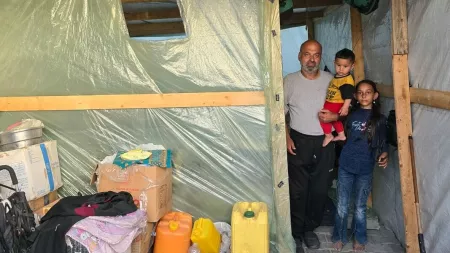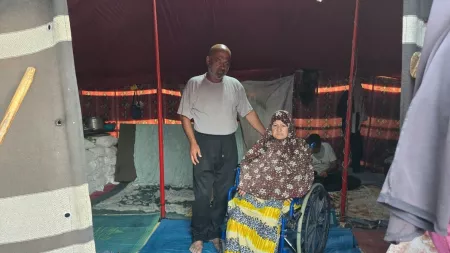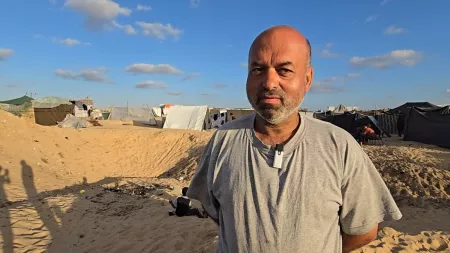Basem*, 48, has a bachelor’s degree in accounting and used to work for the regional government. His youngest son was born three months before the war started. In this interview, he talks about the challenges of finding food for his children, the memories of the house he has built with his own hands, and how the lack of water and sanitation facilities are a challenge for his family, especially for his mother in law who sits in a wheelchair.
What was it like to have to leave your home in October?
The house we lived in, I built it with my own hands. Brick by brick, stone by stone. It took many years, and every inch of this house, every piece of furniture had its own story to tell. The place was filled with dear memories. My wife and I and the rest of our family spent so much time getting this house ready. Everything was so precious to me. In October, we had to leave all of it behind, apart from our ID’s and some of my children’s certificates.
I knew we had to leave.
We knew we had to leave when our neighbour’s house got hit. Five floors, just flattened to the ground. My wife and I hid under the staircase with our youngest children, but I didn’t know where the others were. Once the smoke cleared and we could see again, I found my children full of dust, but thankfully unharmed. We ran out and called our neighbours’ names, tried to find anyone who was still alive.
What a choice! To leave someone behind who is bleeding and crying for help, to try to find a way for your own children to survive.
Many people died that day, and the streets were filled with injured people. I knew we had to leave. Some of my brothers wanted to stay, but I told them there is no way my children will be buried in our house just like our neighbours’. The same night, there was more bombing, and our house was shaking as if there had been an earthquake. My girls were screaming, and we all felt like we would suffocate from all the smoke around us.

The next morning, we packed our things. Some clothes, some food, our important documents. I was telling myself that we would soon go back, hoping that the war would shortly end. When we reached the end of our housing block, it was hit, and bullets were flying around us. We kept walking and walking until we could take a donkey cart. Thousands of people around us were also trying to flee, everything was full of dust and smoke, and the air was filled with fear and the sounds of bombs and crying. It wasn’t until the late afternoon that we finally reached a safer place.
How has this war affected you and your family?
The war has changed everything. For me, anyone who has survived since October 7th, should get a new birth certificate. It is like a new life has started for all of us. We must all start over, utterly changed, because of what happened to us. I can find no words for what we have seen; the horrors cannot be properly described. We went through hell: the bombs flew over our heads. Many people were injured, and we could not stop to help them. I knew if we stopped, we would get injured too. What a choice! To leave someone behind who is bleeding and crying for help, to try to find a way for your own children to survive.
I can find no words for what we have seen; the horrors cannot be properly described. We went through hell.
One of my main concerns is that we don’t have any food. All we eat is canned food. I often don’t eat at all for a day or two, to make sure that my children can eat something. I’ve lost 30 kilos. My children have lost between 10-20 kg. Look at my son, his t-shirt looks like a dress now because of what this war has done to him.
I often don’t eat at all for a day or two, to make sure that my children can eat something. I’ve lost 30 kilos.
My children have all changed, you can see the lack of food and the stress written on their bodies, faces. You can see their fear and anxiety in their eyes. They are hungry and want to eat. They used to be very calm and kind, but now they often shout and act aggressively. It feels like we are living the life of someone who is already dead. We don’t feel alive, but we want to survive. My youngest son isn’t even a year old. Providing for him, finding diapers and suitable food, is one of our biggest challenges. This is not how a toddler should live, and all the smoke around us is badly affecting his little lungs.
It feels like we are living the life of someone who is already dead. We don’t feel alive, but we want to survive.
The situation is also very bad for my mother in law. She is in a wheelchair. We don’t have a bathroom here and use a bucket instead. It is very hard for her, and we really don’t know how to help her.
There is also no water in this area. The water pipes have been destroyed. The municipality brings us water, but it is salty as it is from the sea, and the water desalination plants have also been destroyed.

How have the Rafah invasion and the closure of the border impacted your life?
The Rafah attack hit us hard. We really didn’t think we would have to flee again. We thought Rafah was safe, and we were told to go there. We lived in a tent in Rafah, we set it up on a street close to a market. We lived there for four months, and as difficult as it was, we got used to living in the streets. Our neighbours in the other tents became our friends, and it started feeling like home.
Since the invasion and the border closure, everything got very, very expensive. We had to flee three times so far, each time to places I have not been familiar with. It is hard to get to know new places and people. By now, we have spent all our money. All I have left are 200 Shekels.
I really hope that some day we can live in peace again.
Some of the food we used to buy for 1 shekel now costs 7 or 8 shekels. The prices are very high and very little food is available. It is so hard to find food, that finding something to drink has replaced our hope to find something to eat.
I really hope that some day we can live in peace again. I keep thinking back to our home, to our house, to my job, to the market, and the schools next to us. Everything was nearby, and life was good. I miss the feeling of peace and stability so badly.
*Name changed to protect the respective identity.
